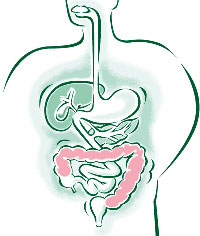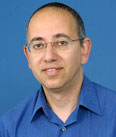Tumors of the digestive system
About the Department
The Department is conducting treatment and monitoring the patients suffering from cancer of the esophagus, stomach, pancreas and intestines. Extensive practical and scientific activities have created vast knowledge and skills in the field of digestive system oncology and allowed us to build an unique framework of diagnostic methods and treatments and apply them to treat complex pathologies of the digestive system.

Among these methods are many to be used for screening and early diagnosis of cancer. These procedures might be called as methods of the future, because, in reality, they are the most progressive in the world of medicine.
Intellectual, financial and technical capabilities of the Department exceeds all criteria for such Departments in Israel and in the world.
There is no doubt that the sensitivity, understanding the psychology of the sick person and his/her family are in a line with the high-quality and efficient system of treatment, care and services, which are established and successfully operated in the Department of Oncology at Chaim Sheba Hospital .
Rectal tumor
Rectal tumors are representing a significant area of the Research for oncology specialists at the Chaim Sheba Hospital.
Treating patients with the rectal tumor, the Department is working closely with the Department of Radiation Therapy that uses the latest generation of drugs, which are giving to the patients an exceptional opportunity to be exposed to the most effective treatment before surgery, which is significant reduced size of the tumor.
This method greatly increases the chance for successful cure.
Tumor of the stomach
Depending on the stage of the disease, we are using various approaches to treat different types of stomach tumors. These methods are:
- After complete surgical removal of the tumor, a patient is treated with the highest level radiation and chemotherapy
- Patient is treated with radio-- and chemotherapy before the operations to reduce the size of the tumor. Subsequently, the surgery is performed to remove the tumor
- In case of metastases, chemotherapy t is carried out, using drugs with minimal side effects
Pancreatic tumor
- A complete chemotherapy and three-dimensional radiation therapy are used after a total surgical removal of the tumor
- If the stage of the disease does not allow to perform operation, the chemotherapy and three-dimensional radiotherapy will be the implemented first and surgery will be performed after that the tumor will be reduced in its size.
Tumors of the bile ducts inside and outside the liver

Recently, we are witnessing a significant increase in such rare diseases such as tumors of the bile ducts inside or outside the liver. Therapeutic goal in treatment of such pathologies is to achieve operable stage of the cancer and subsequent its removal.
Other types of cancer
GIST - gastro – tumor of intenstinal stroma. This tumor is treated with the last generation drug from GLIVEC family and removed surgically, even in the presence of metastases.
Careful research and practice is focused on carcinoid-type tumors of the pancreas (endocrine nature), as well as, the digestive tract.
Clinical research in diseases of the digestive tract.
The Department is actively involved in several research projects on colon cancer, which are performed in a collaboration with foreign counterparts. Results of this research will have a crucial impact on the patients with this disease.
Specifically, the Department is engaged in testing of the newest drug AVASTIN and development methods that can prevent a recurrence of colon cancer. The investigation performed within the State of Israel under the guidance of Professor Dan Adarka, clearly proves the high efficacy of AVASTIN in reducing metastases to the liver in patients with rectal and colon cancer.
Additional research on international level, with the participation of the Department, verifies the effectiveness of another medication, ERBITUX, among patients with colorectal cancer metastases.
We also conduct an international research to develop a unique GIST therapies, which are no longer responsive to drug GLIVEC.

With the participation of Nuclear Medicine Department we are in the process of successful development of two studies that prove the effectiveness of the use of PET-CT a special type of computed tomography for early detection of recurrence of colon cancer.
Innovative treatments for colon cancer
The Department is developing and implementing methods that can cure the patient, who already had liver and lung secondary metastases.
For this reason, the team of the highly skilled surgeons who are specialized in lung and liver surgeries, are involved in the rescue of such patients.
After removal of the secondary neoplasm foci, the entire staff of experts is focused on careful observation and implementation of preventive measures to treat residual disease.
When the team cannot achieve a positive response to conventional treatment of metastases, it used a high doze irradiation of liver metastases via catheterization of the hepatic artery and injection of radioactive particles.
The particles are concentrated directly in the tumor foci and destroy metastases. Numerous experiments have shown that this innovative method is much more effective treatments and improve the quality and longevity of the sick person.
Attending staff:
Professor Dan Adarka - a leading Cancer Hospital doctor, a teacher at the Faculty of Medicine at Tel Aviv University.Specialty: Clinical Oncology and Radiotherapy, general medicine. |
|
Dr. Ido Wolf - Head office stationary Cancer Center, senior physician at the Department of Digestive System Oncology.Expertise: general medicine, oncology. |
 |




